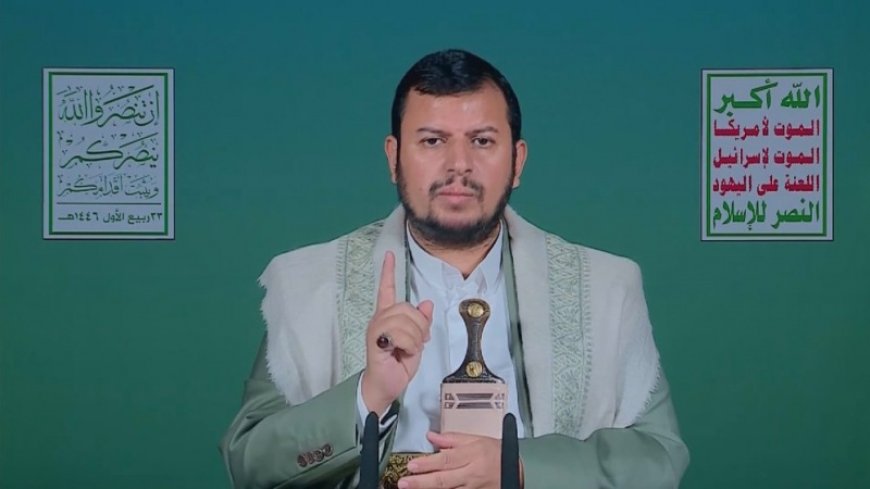Ansarullah Leader Praises Sayyid Hassan Nasrallah: A Defiant Voice Against Israel’s Tyranny
In a powerful televised speech from Yemen's capital, Sana’a, Abdul-Malik al-Houthi, the leader of the Ansarullah Resistance Movement, paid tribute to Sayyid Hassan Nasrallah, the Secretary General of Lebanon's Hizbullah, and condemned Israel’s continued aggression in the region. Speaking against the backdrop of a volatile Middle East, al-Houthi described Nasrallah as a pivotal figure who exposed Israeli plots and played a crucial role in humiliating the regime on the battlefield.

In a powerful televised speech from Yemen's capital, Sana’a, Abdul-Malik al-Houthi, the leader of the Ansarullah Resistance Movement, paid tribute to Sayyid Hassan Nasrallah, the Secretary General of Lebanon's Hizbullah, and condemned Israel’s continued aggression in the region. Speaking against the backdrop of a volatile Middle East, al-Houthi described Nasrallah as a pivotal figure who exposed Israeli plots and played a crucial role in humiliating the regime on the battlefield.
Al-Houthi's words come at a time when tensions in the region remain high, and Israel's actions continue to draw the ire of resistance movements throughout the Middle East. His speech was a clear statement of solidarity with Lebanon’s Hizbullah and a reminder of the growing coalition of resistance groups that oppose Israeli influence and Western interventionism in the region.
Sayyid Hassan Nasrallah: A Symbol of Defiance Against Israeli Occupation
Al-Houthi emphasized that the Israeli regime harbored deep hatred for Nasrallah, not only because of his leadership in Lebanon but also for his key role in standing up to Israel’s occupation and aggression. Nasrallah, who has been a vocal and active leader in resisting Israeli military dominance, has been a thorn in the side of the Israeli government for decades. Al-Houthi lauded Nasrallah’s tireless efforts to unite Muslims and foster brotherhood across sectarian divides, efforts that have made Hizbullah a significant player in the ongoing battle against Israel.
Nasrallah, al-Houthi said, "prevented the plots of the Zionist enemy and caused them a humiliating defeat." This sentiment reflects the broader view among resistance movements that Israel’s expansionist policies have been met with substantial resistance, particularly from Hizbullah, which has grown from a small militia into a formidable military force. Hizbullah’s emergence as a strong and highly effective organization over the past 40 years has not only shifted the balance of power in Lebanon but also within the broader Israeli-Arab conflict.
Israel’s Targeted Hostility and Fear of Hizbullah’s Influence
Al-Houthi did not mince words when discussing Israel’s targeted hostility toward Nasrallah. He framed Israel's aggression as part of a broader strategy to diminish Hizbullah's influence in the region, particularly its unwavering support for Palestine. Israel, al-Houthi suggested, views Hizbullah as a significant threat, not just militarily, but ideologically, as the movement has consistently stood firm in its opposition to the Israeli occupation of Palestinian territories.
Israel's barbaric tactics, according to al-Houthi, aim to erode Hizbullah’s standing and undermine its role as a staunch defender of Palestinian rights. This echoes the broader concern among many resistance groups that Israel's continued efforts to weaken their influence—whether through assassinations, military strikes, or international pressure—are part of a long-term strategy to solidify its control over the region. Yet, despite these efforts, Hizbullah’s reputation has only grown stronger, particularly in the eyes of those who oppose Israel’s policies.
Operation True Promise II: Iran's Bold Retaliation Against Israel
In a significant part of his speech, al-Houthi praised Iran’s retaliatory missile attack against Israeli-occupied lands, referring to it as "Operation True Promise II." This operation, which al-Houthi called the largest missile attack against Israel since the beginning of the Palestinian occupation, was a stark reminder of the region's fragile security dynamics and the willingness of Iran and its allies to respond forcefully to Israeli provocations.
Al-Houthi’s endorsement of the missile attack underscores the deep military and ideological ties between Iran, Hizbullah, and other resistance movements such as Ansarullah. The missile strike, from his perspective, represents a decisive action against a regime that continues to violate international laws and oppress Palestinians with impunity. By highlighting this operation, al-Houthi sought to reinforce the message that resistance movements across the Middle East are not only willing but capable of challenging Israel’s military supremacy.
The Broader Regional Context: Resistance Against Western Imperialism
Al-Houthi’s speech also fits within the broader narrative of resistance movements challenging not just Israel, but what they see as Western imperialism in the Middle East. Hizbullah, Iran, and Ansarullah have long viewed the Israeli occupation of Palestinian territories as part of a larger strategy by Western powers to control the region's political and economic resources. Israel’s military dominance, they argue, is backed by the United States and its allies, who continue to provide the Israeli government with diplomatic cover and military support.
For al-Houthi and other leaders within the resistance camp, the fight against Israel is not merely about territorial disputes but about resisting foreign domination. By framing Hizbullah’s victories and Iran’s missile attacks as part of a larger struggle for justice and self-determination, al-Houthi taps into a widespread sentiment across the Arab and Muslim world—a deep-seated desire to end decades of foreign interference and occupation.













































